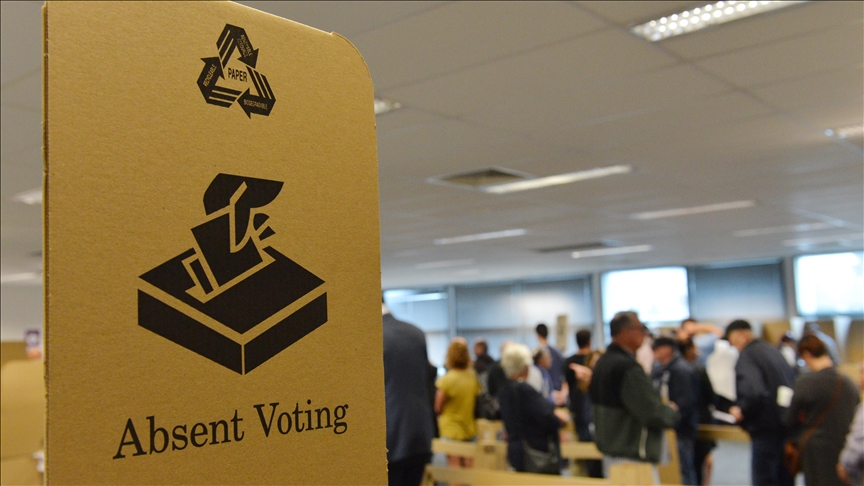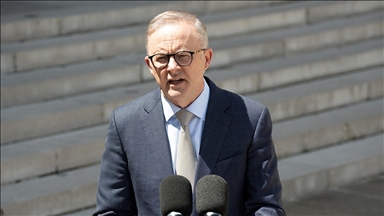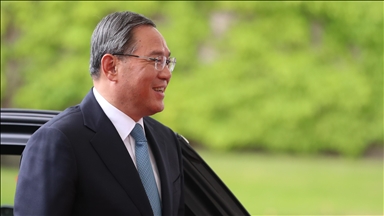Australia election: Cost of living, economy, Trump define ballot
Over 18 million Australians are registered to vote in Saturday’s federal election that pits Prime Minister Albanese’s Labor against the conservative Liberal-National Coalition

- Economic issues dominate the electoral landscape, with housing affordability, inflation, and the rising cost of living at the forefront
- Australian analysts say Trump will be a factor in the outcome, but not as consequential as Canada, with voters trying to decide who could best navigate the challenges presented by his presidency
ISTANBUL
Over 18 million Australians are expected to vote in a federal election on Saturday that is unfolding amid biting economic challenges and foreign policy uncertainties, particularly with US President Donald Trump shaking up global politics.
Voters will elect 150 members of the House of Representatives and 40 senators in a contest that will determine not only Australia’s next government but also how it navigates a turbulent international order and a population increasingly skeptical of its major political parties.
Prime Minister Anthony Albanese of the center-left Labor Party is seeking re-election against Peter Dutton, leader of the center-right Liberal Party. The last two decades have seen no prime minister win back-to-back terms.
In the 2022 election, Labor secured a majority with 77 seats, just one above the threshold of 76, while the Liberal-National Coalition won 58.
If no party achieves a majority this time, Australia could return to a minority government, which last happened in 2010 under Labor.
Independents and smaller parties, particularly the Greens, are expected to make significant inroads again, echoing their surprise performance in 2022.
Cost of living and disillusionment with major parties
Economic issues dominate the electoral landscape, with housing affordability, inflation, and the rising cost of living at the forefront.
Nathan Fioritti, a political analyst from Monash University, says both major parties are framing themselves as fiscally responsible, yet offering little substantial relief for struggling Australians.
This results in rather limited support for the large portion of Australians needing help to weather the cost-of-living crisis, he said.
Housing affordability, in particular, is likely to drive support toward smaller players like the Greens, whose proposals differ markedly from those of the major parties, he added.
Fioritti said he expects a repeat of the 2022 trend, where the Coalition and Labor each secured around 30% of the vote, due to the “increasingly widespread frustration” with the political status quo.
One potential wildcard is voter reaction to Australia’s stance on Israel’s genocide in Gaza.
“Those who are part of or hold sympathy for the Palestinian solidarity movement here are likely to be considering voting for alternative parties and candidates that want to see Australia take a far stronger stand on this issue, while also avoiding a potential Coalition government that would offer more full-throated support for the continuation of the brutal Israeli campaign in the Occupied Palestinian Territories and neighboring states,” said Fioritti.
Campaigns like the Muslim Vote movement, which is focused on six key seats, could play a role in shaping a potential minority government.
The change in these seats could “mirror the surge of independent and Greens candidates who … won seats at the last election, a development that might be consequential as polls indicate there is a good chance we will see a minority government formed following this election,” he added.
Trump’s shadow
While domestic issues dominate, experts agree that the Trump factor is a concern – though not as acute as in Canada, where the US president eventually proved to be a decisive element that favored Prime Minister Mark Carney and the Liberals.
Fioritti said the Coalition’s attempts to mimic Trump’s combative political style have backfired, as that is something “Australians are generally not very keen on.”
Voters will likely be deciding on “which of the major parties will best navigate the challenges presented by the Trump presidency,” he said.
“While this might help Labor get over the line … I do not expect it to be the leading factor behind a Labor victory,” he added.
Charles Miller, a political scientist at the Australian National University, believes the Trump effect could be mitigated by the fact that his administration has signaled “that security cooperation between Australia and the US will continue.”
Balancing between Beijing and Washington
While voters are not directly focused on China, the long-term direction of Australia’s foreign policy remains in question.
Miller believes the next government will maintain close ties with the US “in terms of security affairs,” while also keeping good relations with China.
If, however, US tariffs are not removed from Australian goods “they may move closer to China in terms of trade and the global economy as well,” he said.
“The Chinese line is that the US is disrupting the global trading system and I think Australia agrees with this line,” he said.
Miller said Beijing sees opportunities to peel US allies away, and recent trade negotiations involving China, Japan, and South Korea could signal a broader strategy.
If Beijing “pursues a conciliatory, reassuring policy towards American allies in the Asia Pacific, I think that could bring big benefits for them,” he continued.
While it looks unlikely right now, “in the long run, perhaps, they might be able to change Australian attitudes towards their country and its rise,” said Miller.
However, he reiterated that Canberra will likely “sustain their close relationship with the US.”
“While Australia’s relationship with China is friendlier under Albanese than it was under previous Coalition governments – as it generally is when Labor is in government – I do not expect to see a shift towards stronger alignment with China, regardless of the outcome of this election,” said Fioritti.
Fioritti added that he expects Australia to take a softer approach toward the US “regardless of the outcome of the election.”
If the crossbench is maintained or enlarged in this election it could lead to some individuals who “challenge the idea that Australia should be joined at the hip with the US having some sway over the government,” he said, but stressed that they are unlikely to be “very effective on that front.”
Anadolu Agency website contains only a portion of the news stories offered to subscribers in the AA News Broadcasting System (HAS), and in summarized form. Please contact us for subscription options.







